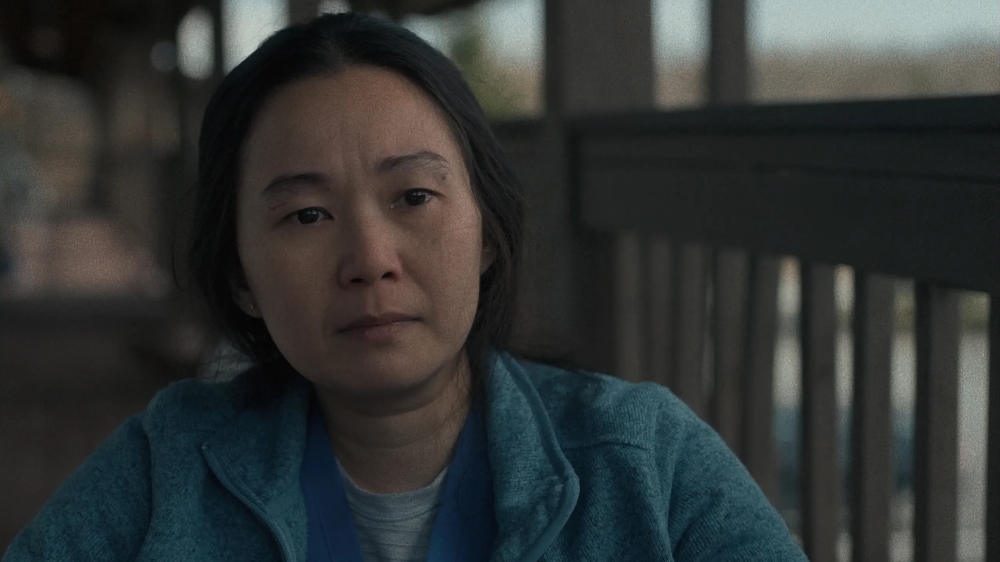Director Darren Aronofsky’s new film, The Whale, stars Brendan Fraser as a dying man, who weighs north of 500 pounds and whose troubled life is embodied by his enlarged form and the self-destructive behavior that led him to look that way. The film immediately raises questions about the presumably unintentional shaming of the obesity it portrays, whether the filmmakers broached this difficult subject with sufficient thoughtfulness, and why this story needed to be told at all. None of these issues are resolved in the movie and may never be answered, but what is undeniable is that its protagonist gives the best performance of his career and arguably of any actor this year.
Fraser plays Charlie, a reclusive English teacher who has difficulty getting up from his couch due to his heft, and whose elevated blood pressure — among other things — has led him to the end of his life. Charlie, recognizing and even welcoming his impending demise, wishes to reconnect with his teenage daughter Ellie (Sadie Sink), who he abandoned when she was eight, in order to have an affair with a younger student. This relationship, we discover, was the happiest moment in Charlie’s otherwise sad life, but it ended with its own tragedy, which eventually set Charlie down his own masochistic path.
The only person who currently cares for Charlie is Liz, played by a brilliant Hong Chau (also in this year’s The Menu), a nurse who happens to be the sister of Charlie’s deceased lover. Also in the picture is Charlie’s ex-wife Mary (Samantha Morton), a woman embittered by Charlie’s abandonment and the cruelty of raising a child alone, and Thomas (Ty Simpkins) a young religious missionary who shows up at Charlie’s door with mysterious purposes.

As the setup suggests, all of these people bear their own crosses and are generally troubled, angry, sad, or all of the above. Most significantly, they all seem to have a love-hate relationship with Charlie, who ambles between wanting to be left entirely alone to his suffering, but also depends significantly on them for even basic bodily movements. Liz is the one who cares the most, though she is angered by Charlie’s self-harm, while the daughter Ellie begins as the one full of the most hate, she transitions into understanding as the film’s tortuous sequences play on.
The setting is a claustrophobic, dingy house, as dark and sweaty as Charlie himself, courtesy of Cinematographer Matthew Libatique and Art Director Jarusama Arunchai. Of course, the below-the-line accolades belong almost entirely to Make-up Artist Adrien Morot, who created a body-sized prosthetic that depicts Charlie’s shape. The movie relies almost entirely on this creation and on little-to-no CGI, and it is all the more impressive that Brandon conveyed such a powerful, gut-punch performance from behind the costume. Oscars-wise, acting wins often go hand-in-hand with make-up wins – this has happened several times this century, with Jessica Chastain last year being the most recent – and awards pundits should fully expect that if Fraser is to win, so will Morot.
But a sad story and a distinctive body suit do not alone a good movie make. Superb acting is a necessary piece, but The Whale will convince — or disgust — audiences based almost entirely on the merits of Samuel D. Hunter’s screenplay alone.
It is fair to ask why this movie was made? What is its point? Do we really need yet another troubled, tragic gay character? Is this depiction of morbid obesity — one that literally kills a human — tactful or even necessary? At the core of the film is the allegoric reference that the title invokes, which is presumably to the size of the protagonist. In reality, however, Hunter’s script tries to make the title a reference to Herman Melville’s classic novel Moby Dick, with which Charlie is grotesquely fascinated. Charlie is obsessed with the obsessive nature of Moby Dick’s main protagonist, with Ishmael’s reckless search for a self-imagined nemesis that embodies all of his own suffering and demons. In the end, Moby Dick the whale is meant to represent Ishmael himself, such that it is fair to assume that Hunter and Aronofsky are saying that Charlie is his own worst enemy.

Setting aside whether that is a kind, fair, or even accurate portrayal of why Charlie is the way he is – I’d argue that tragedies outside of his control actually cause his demise – Aronofsky and Fraser are committed to portraying this theory of Charlie. The movie’s most disturbing scenes are those moments when Charlie violently consumes improbable amounts of food in an obvious attempt to destroy himself, the presumptive “whale” of the story. A heart-pounding, disturbing, and dark soundtrack by Rob Simonsen accurately tracks Fraser’s exaggerated and upsetting body movements, much like Aronofsky has shown us he can do in some of his more physical works like Black Swan and Requiem for a Dream.
Indeed, the conceit of the human body as an anthropomorphic vessel, as something that is treated like an animal by its inhabitant to the point of converting into one, is nothing new in Aronofsky’s work. The allegory, which includes Charlie imagining moments he once lived, just feeling the waves of the ocean crash into his feet, does not work quite as well as it has in other Aronofsky movies, except for Fraser’s performance, which is even better than the memorable ones from the director’s past work.
None of this answers the questions posed earlier in this review – Why was this story made? Why should we care about these perturbed characters, and why should we even bother with putting ourselves through this thoroughly disquieting and unnerving experience? The only answer to these questions lies in the performance itself, and the below-the-line bells and whistles with which Aronofsky adorns the proceedings. Those are, in a word, brilliant, and elevate an upsetting film into something worth watching, something as unforgettable as nearly every single other movie by this very singular director.
Grade: B+
The Whale is now playing in select cities via A24, and it will expand nationwide on Dec. 21.





